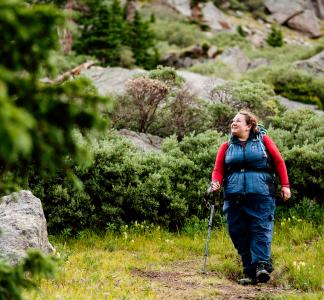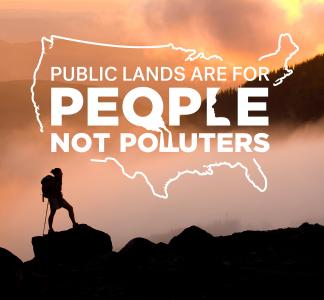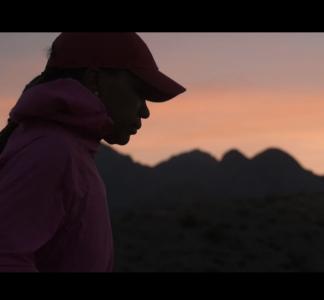Podcast underscores need for representation, inclusion and equity in the environmental movement
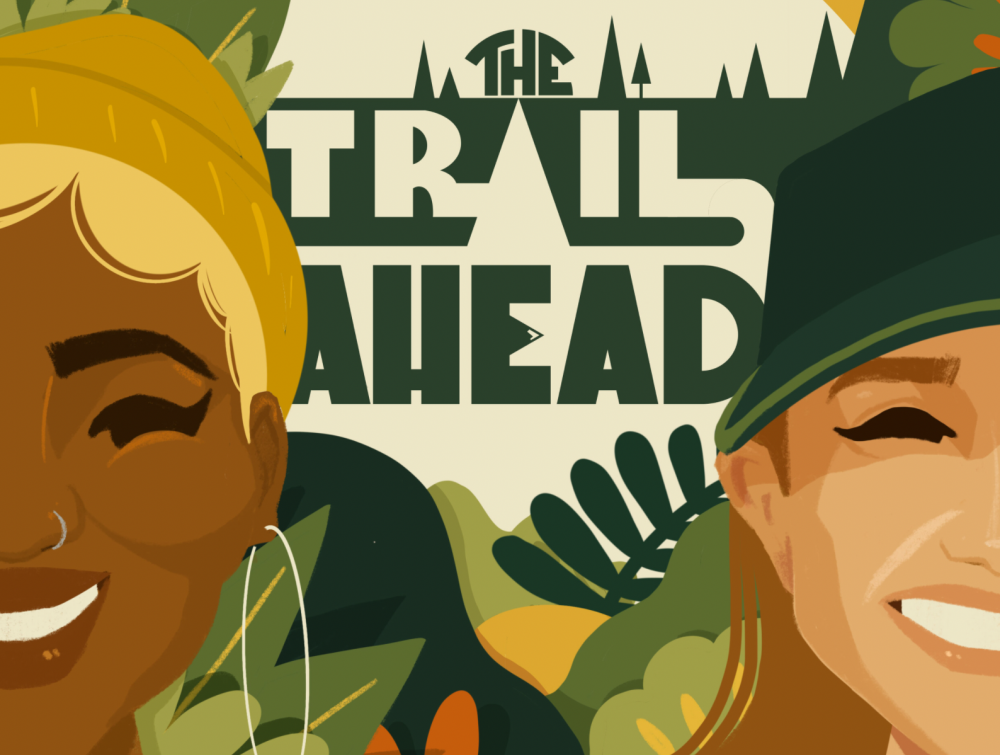
The Trail Ahead, with Faith E. Briggs and Addie Thompson
The Trail Ahead podcast invites folks from all backgrounds to engage in authentic conversations on race, the environment, history and culture
AUTHOR: ELIZA BOETSCH
Photos by Fred Goris
Environmental advocates and athletes, Faith E. Briggs and Addie Thompson, wanted to create an inclusive space where folks from all walks of life could engage in real, imperfect conversations on issues of race, history and the outdoors that lead to tangible change. So, they created The Trail Ahead — a podcast that invites listeners along for conversations with activists, thought-leaders, artists, scientists and comedians on topics of outdoor equity, climate justice, racism and more.
We sat down with Addie and Faith to learn more about their experience creating The Trail Ahead and their hopes for the podcast and the environmental movement, among other topics.
You can listen to The Trail Ahead podcast on Spotify, Apple Music or here.
This conversation has been edited for clarity and length.
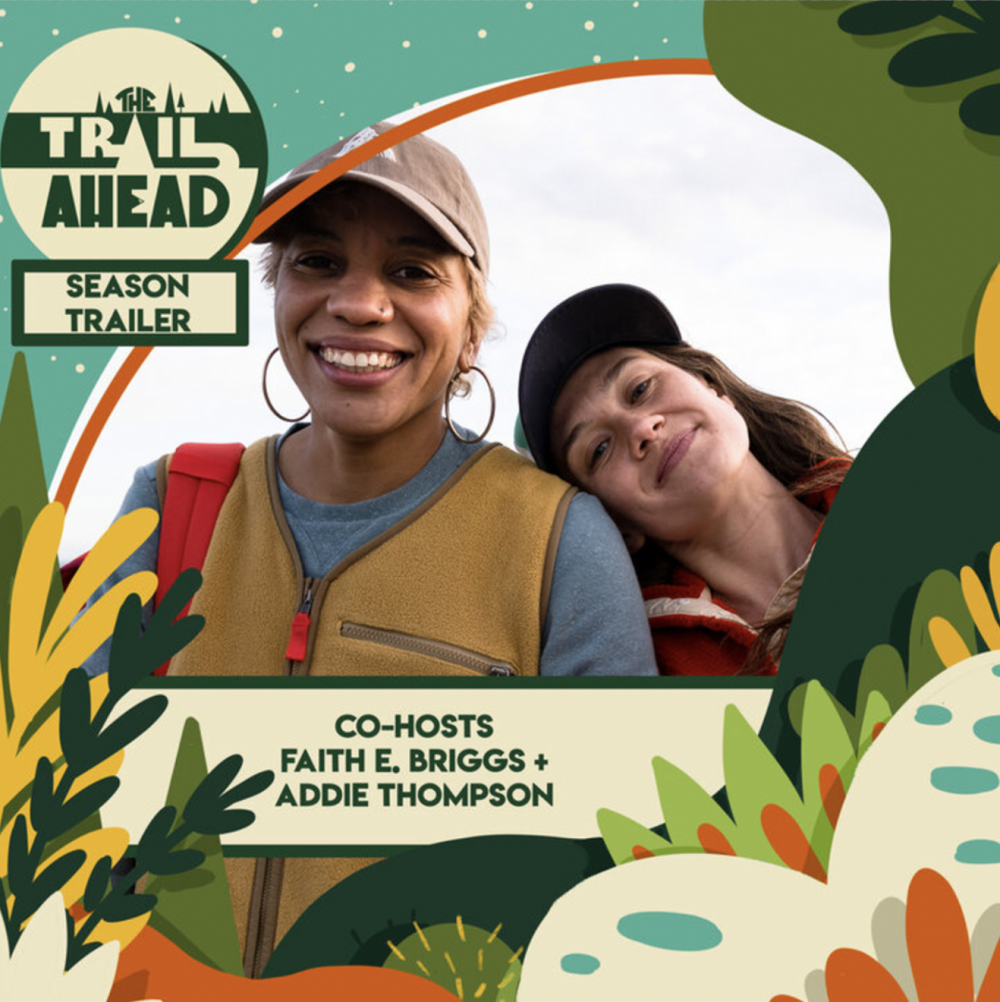
Co-hosts Faith E. Briggs and Addie Thompson
Can you tell us a little bit about yourselves and your podcast The Trail Ahead?
Faith: With The Trail Ahead, Addie and I wanted to go deeper and bring people with us. We know that there is an appetite for conversations about race and history and environment that is contextualized in a way that might help us better understand one another as neighbors. We believe that many people don’t have anyone to talk to about their questions. The racial reckoning of the last 2-3 years has been confusing for all kinds of people. White people feel like they are walking on eggshells, many feel embarrassed that they don’t already have more nuanced understanding of what it feels like to be nonwhite in America. People of color are being asked to be experts, not only in their own experiences, but also in diversity and inclusion conversations — areas where they might be new to the conversation. We hope to invite people in, to create a safe space where opinions, conversations and questions are welcome. Our hope is that better conversations can help us learn how we can better support one another, so that we can be co-conspirators in justice and make a better world together, with more understanding.
We hope to invite people in, to create a safe space where opinions, conversations and questions are welcome
We called it The Trail Ahead because we focus on conversations related to the outdoors — so the literal trails we run, walk, hike and ride on —, but also the metaphorical trail ahead and how we will come together to keep traveling it.
You describe the podcast as “conversations at the intersection of race, environment, history and culture.” What does intersectionality mean to you and why is it important to view environmental issues — and really everything — through that lens?
Faith: Intersectionality means that we have to take into consideration all aspects of identity and we cannot ask people to choose one part of themselves over another part of themselves. An intersectional approach looks at the many facets of identity: race, class, gender, religion, ethnicity, citizenship status, Tribal affiliation, sexual orientation, disability and says, “there is space to consider all of those needs, you can bring your full self here.”
Too often, BIPOC folks in environmental movements were basically told: Let’s prioritize protecting these trees or this water first, and then we’ll get to the conversation about the Black and Brown folks being affected by what is happening to those same trees or that same water. How does that make sense or make anyone feel that they and their community are being valued in a joint effort? An intersectional approach considers other ways of knowing, bringing Indigenous and Afrocentric leadership and knowledge to the forefront when considering methodology and approaches to issues at hand. For environmental issues, it’s particularly important to have an intersectional approach, because questions of our natural world contextualize our very lives, everything that we do, so we need to have an “all hands on deck” approach and we cannot afford to not listen to anyone. There is too much at stake.
Addie: The issues of the environment, wild spaces, outdoor recreation, access, representation, equity, justice — these are all interlinked and are inextricable from one another. We cannot make progress in one area without making progress in another, namely around climate change. We wanted this podcast to be about a variety of different things because we felt that the intersectionality of this conversation was really where our sweet spot would be, where we felt the most change could be made and where we could have the most leverage.
The issues of the environment, wild spaces, outdoor recreation, access, representation, equity, justice — these are all interlinked and are inextricable from one another. We cannot make progress in one area without making progress in another
The conservation space is incredibly white and we wanted to work to change that, start to break that open more, and have these hard conversations, with folks from CEOs from the biggest green conservation organizations all the way to activists and advocates out here already doing the work. We wanted to not only wake up white audiences and start having those conversations with more white folks, but we also wanted to make sure that we were celebrating folks that are already out there doing the work.
I also wanted to mention — I’m white, Faith’s Black — we felt that this conversation as an interracial dialogue was extremely important to have. Faith is someone that, since I met her, has said, If we keep these conversations in one community, we are never going to make the change that we feel that we can make. We are never going to scale up that change and scale up that disruption from one or two communities. We need to bring everyone to the table. Of course, we’ve gotten questions about why a white woman is co-hosting a podcast about diversity in the outdoors — a very fair question. What we are excited to bring to the table here is that intersectionality and the interracial dialogue, the genuine friendship between two people of different races and the ability to have that foundation and then have on top of that a conversation that’s real and raw and authentic across races.
Through your work you’ve had the chance to speak to some pretty incredible folks and engage in important and thought-provoking conversations. Looking back, what do you feel has been the highlight of creating The Trail Ahead?
Faith: There are so many highlights. First, the joy that we’ve gotten to share with our guests. We feel so lucky to be in conversation with all of our guests and in many ways, we are just getting started. Figuring out how to do a podcast at all was a big learning curve for us, we’re still learning how to really make it our own, and dig even deeper into the topics and perspectives that our guests share with us. I honestly can’t pick a favorite episode because there were so many gems in every one.
Addie: A highlight of creating The Trail Ahead podcast has absolutely been meeting our incredible guests and getting to experience a day or morning in their life. I am blown away by our guests. I come away from every conversation we record just buzzing with energy and hope for the future and excitement for the fact that that person exists in the world and they're making the change they're making.
Even deeper than that — to have folks come on the podcast, most of whom are not white, and talk about their struggles with whiteness, their time in the outdoors, their experiences as either athletes or scientists or media personalities, and sometimes framing a call to action to white listeners and sometimes just sharing their personal experiences. I feel exceptionally humbled to have been in spaces where our guests feel comfortable enough to share these experiences in front of me or with me and with Faith.
Another highlight has been working with Faith. We've been friends for many years. To deepen our friendship towards a working, co-producer relationship is not always easy, but we have navigated it in a way that I feel has deepened our friendship and deepened the work that we do and the conversations we were able to have. It's just been an exceptional privilege to work with Faith in this way. I can't underscore how amazing that's been, and she's such an incredible collaborator and a visionary thinker.
Many of your episodes discuss the importance of representation in the outdoors and in conservation work. In episode 1 with Danni Washington, a science communicator, TV and podcast host, Danni describes representation as, “if you can see it, you can be it.” What does representation mean to you, especially in the fields of environmentalism and conservation?
Faith: Representation is huge to me. It’s everything. It's the reason I do all of the work that I do. Images have so much power. Historically, propaganda is how wars were started and also how people were convinced that they were each other’s enemies. I know that might sound dramatic but I don’t believe it is… I know all too well that for people of color in America, we were painted as being non-human, having exaggerated features, being less than, looking like “savages.” We still very much need to [combat these stereotypes]. Whenever a conscious effort is made to disenfranchise people, a conscious effort has to be made to do the opposite. Stopping is not enough. Effort has to be put into undoing the harm that was done. Wider representation is the creation of a wider path for everyone to move forward. That is a part of what we do in The Trail Ahead, and it’s why creating accompanying visuals for each episode was also so important to us. We wanted to make sure we were contributing to increasing representation in multiple mediums.
Addie: In our first episode, Danni Washington says, “If you can see it, you can be it.” That truly embodies our view of representation as carried through the rest of the series. Sometimes we had folks [as guests on the podcast] that are white and are allies, and most of the time we had folks who were representing what they wanted to see in various fields because they didn't see it. I think the same thing about Faith. She is someone who in many many spaces she enters, doesn't see anyone who looks like her, and that can be an exhausting experience — an exhausting existence. Brooklyn Bell, a guest on the podcast and professional mountain biker and skier said, “I'm tired, I get really tired, and sometimes I don't want to be the first.” I think that’s the issue here: If you can see it, you can be it. Well, that's all well and good for folks that see themselves on TV in the outdoors, at a trailhead, on a climbing wall, but what if you don't see yourself? I think that's what I've been floored by — the ability and the determination of a lot of our guests who have come on the show and talked about their experience of not seeing themselves in their spaces and going and doing it anyway.
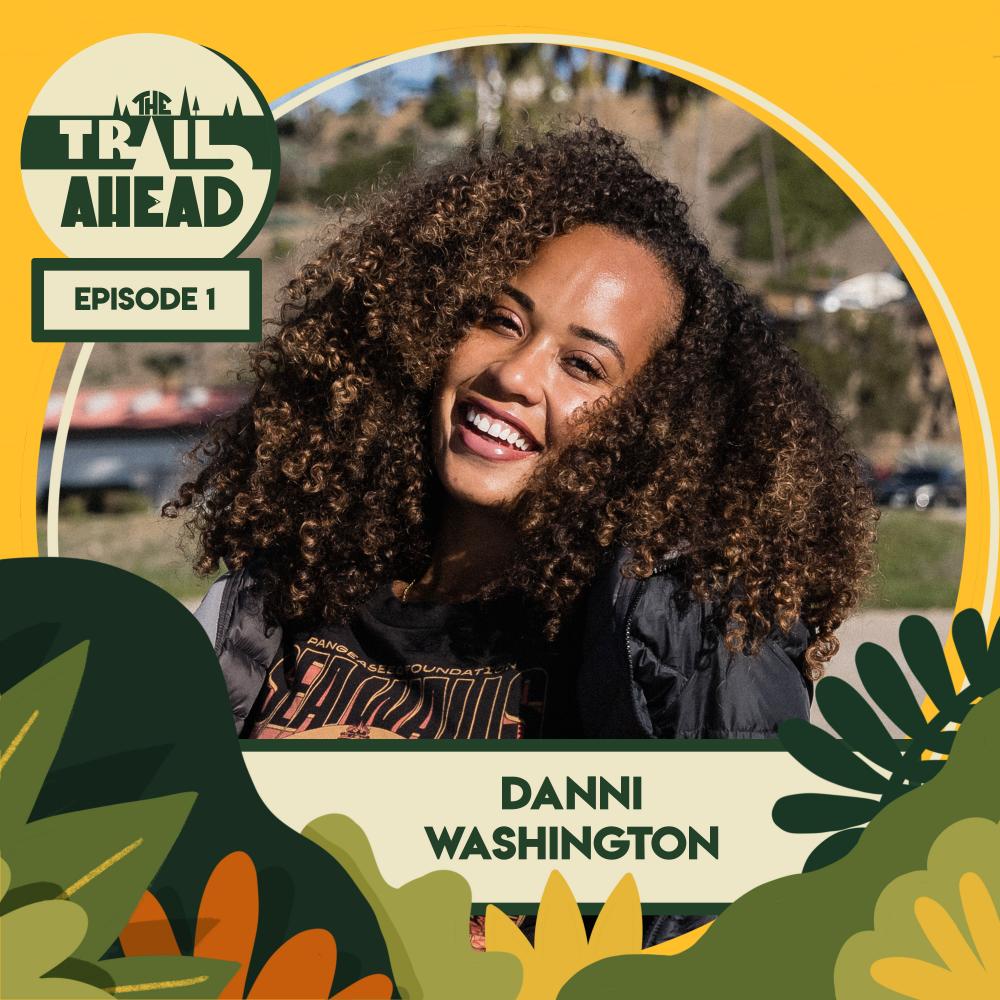
Danni Washington, science communicator, TV and podcast host
In Episode 4 with Layel Camargo, a climate activist, comedian and organizer, Layel spoke about how the outdoors community often tells us that there is one very white-centric way to interact with nature. They stress that this needs to be diversified to include all of the ways that people of different backgrounds and abilities spend time outdoors. Can you speak a little more about this?
Faith: I’ve spoken at length with friends about the idea that there is one way to “be outdoorsy.” While many of us spent time outside playing as kids, we often lose that freedom and access and the luxury of time as we become adults. Then, when we want to reconnect, we think you have to wear certain boots to go hiking, or that the only trail snacks you can have with you are trail mix or granola bars. These societal messages, often impressed upon us by the media, makes us think that there is only one way to engage in the outdoors. We are led to believe that we aren’t a runner if we aren’t going a certain pace, or we can’t learn to ski after a certain age. The reality is that those who have had historic power — mainly white, male and monied individuals— helped create and control these messages. And everyone else has been asked to contort themselves to fit that mold.
We live in a mainstream culture that has historically valued white and Eurocentric values, including rugged individualism. For many of us, that is not what we saw modeled growing up. That rugged individualism is not what has helped our communities remain resilient and survive, so why adopt it now? Rewriting these messages, and widening the spectrum of representation through stories will allow more people to see themselves in the outdoors on their own terms. This can lead to individual and community healing as well as a larger community of land and water protectors.
Addie: Layel Camargo mentions a very white-centric way of interacting with nature, of accomplishing a feat, or of summiting a peak, or of skiing a line, or climbing a route. It is very dominated by white narratives. I believe they also go as far to say colonial narratives and male-body narratives, where there's this sense of adrenaline, accomplishment, almost aggressive approaches towards the outdoors. What I really loved about their description and perception of their time in outdoor spaces was questioning why can't a half mile walk be an accomplishment? Why can't me laying under a tree be an accomplishment? The truth is — I think it can be. How can we shift our societal perceptions of accomplishments and even just interactions with nature to be more inclusive, to widen the aperture and to again, disrupt this space of very narrow-minded focus on the goal, the objective, the accomplishment? Layel stressed the need to diversify how we connect with nature and what it means to be happy and feel accomplished in your own versions of being connected to the outdoors.
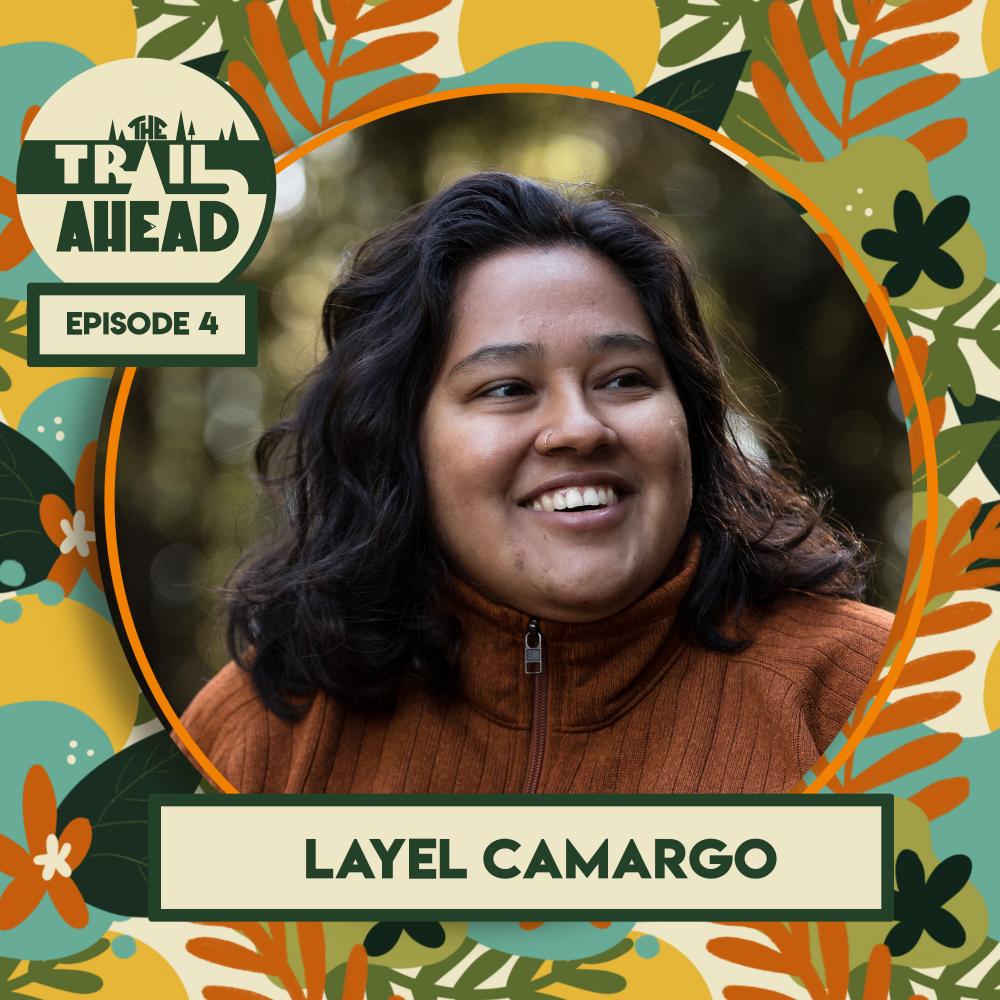
Layel Camargo, climate activist, comedian and organizer
How do you feel that environmental organizations and the outdoor community as a whole can begin to make the space of environmentalism more equitable and inclusive?
Faith: If we aren’t talking about environmental justice, then we aren’t doing our jobs. If there is an environmental organization that thinks you can talk about clean air and clean water, without talking about the communities with the least access to these things, then they are behind the times and need to catch up.
Addie: There are a lot of opportunities here. I think it's about elevating and promoting environmental organizations with underrepresented leadership and teams—folks that are grassroots level on the front lines working day in and day out tirelessly to protect their community in terms of either mitigation or adaptation of climate change. We need to be funding those organizations, we need to be continuing to uplift and tell their stories. Climate change is a justice issue. It's an equity issue. So, if we don't fund and elevate and support organizations that are working in every regard around climate change, it won't be successful. We can't be successful without everyone involved.
I think it's about elevating and promoting environmental organizations with underrepresented leadership and teams—folks that are grassroots level on the front lines working day in and day out tirelessly to protect their community in terms of either mitigation or adaptation of climate change
I would also just really encourage white folks all over the outdoor industry, environmental space or conservation space to do their own learning. Let's read, let’s educate ourselves, ideally without going to a person of color to educate us. Let's engage in those conversations, but not until we feel like we've really gotten a grounding for [questions like]: What are the issues that a lot of people face that we don't,that we've never thought about before? What makes us the most uncomfortable and how can we lean into that discomfort? Maybe call people out in our lives that we hear using harmful language or exclusionary language or ideas. The earlier that we can start having these conversations and opening this dialogue, the better. The change has to come from the white community. I can't underscore that enough: we have to make this change in ourselves and in our community to make it possible for new voices, faces, leaders, people, to come into this space and feel that they are welcome, valued, and that they can take ownership and leadership and play a key role in change-making.
